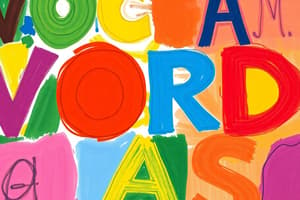Podcast
Questions and Answers
Match the type of vocabulary with its correct definition:
Match the type of vocabulary with its correct definition:
Active Vocabulary = Words that are recognized and understood but not frequently used. Passive Vocabulary = Words used regularly in speech and writing. Contextual Learning = Understanding words through context, synonyms, and antonyms. Vocabulary Acquisition Techniques = Methods used to enhance vocabulary learning.
Match the source of vocabulary development with its description:
Match the source of vocabulary development with its description:
Reading = Exposure to diverse texts enhances word knowledge. Listening = Engaging with conversations and media introduces new terms. Conversation = Interacting with others helps reinforce and expand word usage. Writing = Practice in writing encourages the use of new vocabulary.
Match the term to its corresponding example of word formation:
Match the term to its corresponding example of word formation:
Derivation = 'happy' becomes 'unhappy'. Compounding = 'toothbrush'. Blending = 'brunch' from 'breakfast' + 'lunch'. Acronyms = 'NASA'.
Match the vocabulary acquisition technique to its benefit:
Match the vocabulary acquisition technique to its benefit:
Match the importance of vocabulary with its description:
Match the importance of vocabulary with its description:
Flashcards are hidden until you start studying
Study Notes
Vocabulary
-
Definition: Vocabulary refers to the set of words known and used by a person or group in a particular language.
-
Types of Vocabulary:
- Active Vocabulary: Words used regularly in speech and writing.
- Passive Vocabulary: Words recognized and understood but not frequently used.
-
Sources of Vocabulary Development:
- Reading: Exposure to diverse texts enhances word knowledge.
- Listening: Engaging with conversations and media introduces new terms.
- Writing: Practice in writing encourages the use of new vocabulary.
- Conversation: Interacting with others helps reinforce and expand word usage.
-
Word Formation:
- Derivation: Creating new words by adding prefixes or suffixes (e.g., 'happy' becomes 'unhappy').
- Compounding: Combining two or more words to form a new word (e.g., 'toothbrush').
- Blending: Merging parts of words to create a new term (e.g., 'brunch' from 'breakfast' + 'lunch').
- Acronyms: Forming words from the initial letters of a phrase (e.g., 'NASA').
-
Contextual Learning:
- Word Meaning: Understand words through context, synonyms, antonyms, and definitions.
- Collocations: Learning which words commonly go together (e.g., 'make a decision' vs. 'do a decision').
-
Vocabulary Acquisition Techniques:
- Flashcards: Effective for memorization of definitions and usage.
- Word Maps: Visual representation of a word's meanings, synonyms, antonyms, and usage.
- Reading Aloud: Helps with pronunciation and reinforces word memory.
- Language Games: Interactive activities that make learning new vocabulary enjoyable.
-
Importance of Vocabulary:
- Enhances communication skills.
- Aids in comprehension of texts and spoken language.
- Broadens knowledge and understanding of various subjects.
- Contributes to academic success and professional development.
Vocabulary Overview
- Vocabulary is the collection of words known and utilized by individuals or groups within a language.
Types of Vocabulary
- Active Vocabulary includes words regularly employed in speech and writing.
- Passive Vocabulary consists of words recognized and comprehended but not often used.
Sources of Vocabulary Development
- Reading diverse texts contributes significantly to expanding word knowledge.
- Listening to conversations and media introduces new vocabulary items.
- Writing practice encourages the integration of new words into personal vocabulary.
- Engaging in conversations reinforces and broadens vocabulary usage.
Word Formation
- Derivation involves creating new words by adding prefixes or suffixes (e.g., "happy" to "unhappy").
- Compounding merges two or more words to form a singular new term (e.g., "toothbrush").
- Blending combines parts of words to generate a novel term (e.g., "brunch" from "breakfast" + "lunch").
- Acronyms are formed by using the initial letters of a phrase (e.g., "NASA").
Contextual Learning
- Understanding word meanings can be achieved through context, synonyms, antonyms, and definitions.
- Collocations refer to familiar combinations of words (e.g., "make a decision" vs. "do a decision").
Vocabulary Acquisition Techniques
- Flashcards serve as an effective tool for memorizing definitions and usages.
- Word Maps provide a visual representation of a word’s meanings, synonyms, antonyms, and applications.
- Reading Aloud aids in pronunciation and reinforces memory of words.
- Language Games offer interactive and enjoyable methods for learning new vocabulary.
Importance of Vocabulary
- A robust vocabulary enhances overall communication skills.
- It aids in comprehending both written texts and spoken language.
- A diverse vocabulary expands knowledge across various subjects.
- Strong vocabulary contributes to academic achievement and professional growth.
Studying That Suits You
Use AI to generate personalized quizzes and flashcards to suit your learning preferences.




